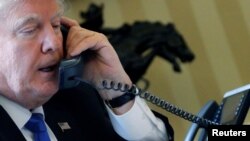Since his January inauguration, U.S. President Donald Trump has spoken with more than a dozen world leaders. A list released recently by the White House listed 16 and included many of Washington’s traditional allies, even Russia. For some, one country was curiously absent: China.
And that has some China watchers wondering not only why, but when Trump will speak with his Chinese counterpart, Xi Jinping.
Since stepping into office, Trump’s focus has largely been on domestic issues and national security. And analysts say his pledge to put America first has meant he needs to focus on bringing jobs back to the United States, not a country he has accused of stealing those opportunities.
The U.S. president’s campaign pledge to bring jobs back to America is not only at odds with China’s interests, but his administration’s statements on what Beijing regards as "core interest" issues such as disputes in the South China Sea or a decision to speak with Taiwan’s president, Tsai Ing-wen, have made China uneasy.
“From Mr. Trump’s perspective, he has to sort out his various policies; sometimes there are contradictions and so on, before he could have a coherent conversation with [China's] President Xi,” says Oh Ei Sun, a senior fellow at the S. Rajaratnam School of International Studies in Singapore.
Still on radar
The delay does not mean that China is not on Trump’s radar, says Wong Ming-hsien, a professor at the Graduate Institute of International Affairs and Strategic Studies at Tamkang University in Taiwan.
Wong says that when dealing with China, it is not just one issue. When it comes to U.S.-China relations, there is a whole host of problems, including the Chinese currency, the trade deficit, cyber security and other issues.
“When dealing with one issue related to China, there are always many other complex issues that come up,” Wong says.
By contrast, Wong says many of the issues Trump has taken on are ones the United States can take the lead in addressing, such as Secretary of Defense Jim Mattis' recent trip to South Korea and Japan or Trump's recent phone conversations with leaders like Australian Prime Minister Malcolm Turnbull and Mexican President Enrique Pena Nieto.
“China is the other superpower and I think even with Mr. Trump, he will take some precautions in carrying out such a conversation,” Oh Ei Sun says. “I think that President Trump and President Xi will meet up in the very near future, be it at a bilateral summit or on the sidelines of an international conference.”
Wong, however, says it makes sense for Trump to try not to concentrate on China policy issues now because President Xi's key focus this year too is on issues at home.
Later this year, China will hold a leadership reorganization, scheduled for every five years, during which Xi is expected to try to further solidify his power.
Hidden message
Wong says for the thornier issues, Trump may wait as long as six months before he tries to tackle any bigger issues with China.
Some analysts see the delay as a hidden message or tactic by Trump. They also say it highlights how the new administration may completely revamp the channels and mechanisms the two countries use to interact.
Shi Yinhong, a political scientist at Beijing’s Renmin University, says that much like he has done with other leaders, Trump appears to be trying to show his toughness.
“This absence of a phone call from Trump to Xi Jinping seems to indicate a deliberate approach on the part of President Trump to show that he is going to be more firm,” Shi says.
Given Trump’s negative remarks on the campaign trail and criticism of China in economic, financial and security fields, a call could help clear the air.
"A phone call cannot solve any major concrete issues, but what is required is an exchange of some good words or goodwill between the two presidents, which unfortunately has still not happened," Shi said.




